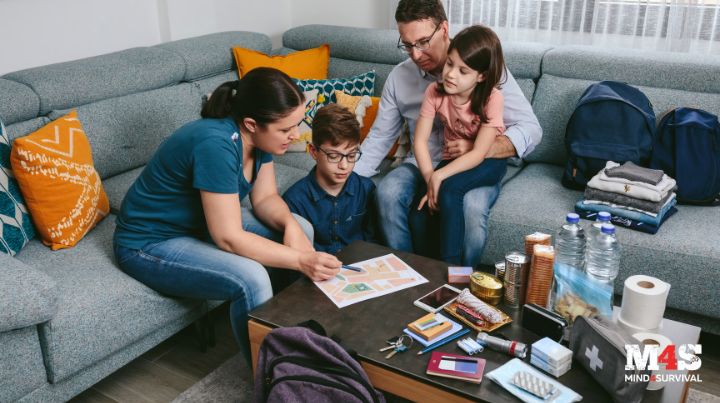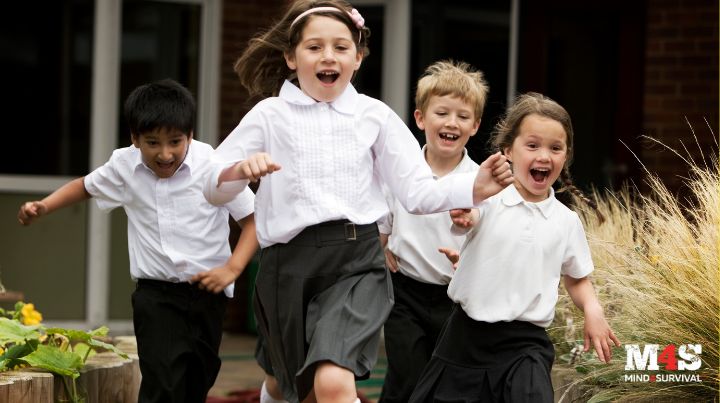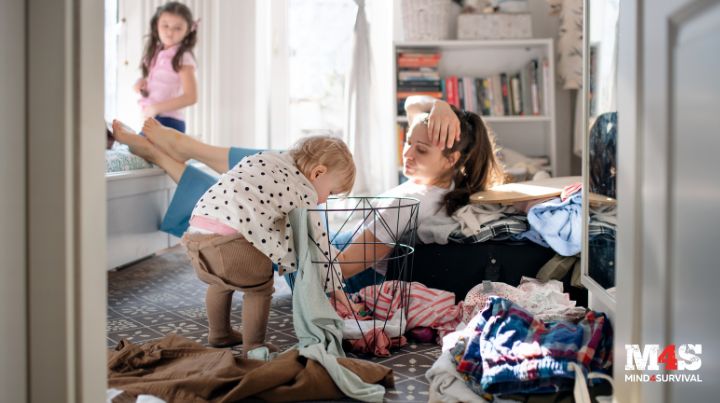Long-Term Disaster Considerations for Families with Children

Part of preparedness is about fostering a sense of security and readiness within your family. For those new to preparedness, the thought of long-term disasters can be overwhelming. However, with practical steps and a calm approach, you can prepare your family without causing fear or anxiety. This article will guide you through critical considerations for families with children, focusing on realistic and manageable actions you can take to ensure your loved ones are safe and cared for during a long-term disaster.
Who Gets Them if They're at School?
Planning for the safety of your children during a long-term disaster includes ensuring they are safely reunited with you if they are at school when disaster strikes. It is crucial to know who will pick them up and where they should go if you can't get there immediately. A clear, predetermined plan can provide peace of mind and ensure everyone's safety. Here are some critical steps to consider:
- Communication Plan: Ensure your children know who will pick them up in various scenarios. It might be you, a neighbor, or a family member. Communicate this plan with the school and make sure your children understand it, too. Ensure your child has the alternate phone number printed or memorized in case their phone is lost, damaged, or unusable.
- Alternate Pick-Up Person: Designate an alternate pick-up person and provide the school with their contact information. Identify a trusted neighbor or friend who lives nearby and can take care of your children until you arrive. Make sure your children know this person well. Ensure this person is reliable and capable of handling the responsibility.
- Reunification Points: If your home is inaccessible, decide on safe locations where your family can meet. Choose easily recognizable spots that are also safe. This could be another friend or relative's house. Also, consider locations such as libraries, fire, and police stations, where there is a high volume of responsible people who will help if there's a problem.
- Challenge Word: Teach your children a safe word so they can challenge anyone attempting to pick them up. If possible, wait to tell anyone the safe word until you know they're picking up your kids for you.

Bug Out Bags for Children
Ensuring the well-being of toddlers during a long-term disaster requires careful preparation. Unlike older children or adults, toddlers have unique needs that must be addressed to keep them comfortable and safe. Preparing a toddler-specific bug-out bag is a crucial step in this process. This bag should contain items that cater to their unique needs and comfort.
- Essentials: Include diapers, wipes, a change of clothes, and essential hygiene items.
- Food and Water: Pack enough snacks, age-appropriate food, and water for at least seven days. Include utensils and bottles as needed. Store a wide range of foods with some of your children's favorite snacks to ensure they get the nutrition they need for maintaining health and a sense of normalcy without getting bored of repetitive meals.
- Comfort Items: Add favorite toys, blankets, or pacifiers to help soothe your toddler during stressful situations.
- Medical Supplies: Keep at least one month's worth of all prescription and needed over-the-counter medications. Store them in a cool, dry place and rotate them regularly to ensure they don't expire. Also, ensure you have a first aid kit and are stocked up on any other medical items your child may need.
How to Explain Things to Them
Communicating with children about disasters without causing fear requires a delicate balance. It's crucial to convey the seriousness of the situation while maintaining a sense of calm and security. Children look to adults for reassurance, so your tone and approach play a significant role in how they perceive the information. The goal is to educate them on preparedness in a way that empowers rather than frightens them.
- Age-Appropriate Language: Use simple words and concepts that match their age and understanding. Avoid using alarming terms.
- Focus on Safety: Emphasize the steps you are taking to keep everyone safe rather than the potential dangers.
- Practice Drills: Conduct regular emergency drills in a fun, game-like manner. This helps children learn what to do without feeling scared.
- Answer Questions: Be open to their questions and provide honest, calm answers. If you don't know the answer, reassure them that you will find out together.

What Tasks Can They Help With?
Involving children in preparedness tasks can give them a sense of control and responsibility, helping them feel more secure during uncertain times. Not only does it teach valuable life skills, but it also fosters a sense of teamwork and cooperation within the family. Assigning age-appropriate chores can make children feel included and important, turning preparedness into a family effort rather than a solitary task. Here are some ways children of different ages can contribute to your preparedness plans.
- Younger Children: Simple tasks like fetching items, organizing supplies, or helping with packing can be suitable.
- Older Children: They can assist with more complex tasks like checking inventory, learning basic first aid, and helping to prepare emergency kits.
- Making it Fun: Turn chores into games or competitions to keep them engaged and motivated.
What are the Non-Negotiables for Your Kids?
Every family has non-negotiable needs for their children, especially during a long-term disaster. These needs are the essentials that ensure your children's physical and emotional well-being and provide a sense of security and normalcy amidst uncertainty. By identifying and prioritizing these essentials, you can help maintain a stable and comforting environment for your children. Below are some key non-negotiables for your family to consider.
- Medical Needs: Ensure you have a sufficient supply of any necessary medications and understand how to store them properly.
- Comfort Items: Items that provide comfort and familiarity, such as favorite toys or blankets, can be crucial in stressful times.
- Food and Water: Make sure you have a variety of food on hand that meets their daily nutrition needs and keeps the meals fun and exciting, giving your children something fun to look forward to.
- Family Time: I recommend having meals as a family whenever possible. Family meals will help you stay in tune with your children's moods and keep them informed about anything that worries them or is on their minds.
- Educational Materials: Maintain a collection of books, puzzles, and educational games to keep their minds active and reduce stress.
Do You Have a Support Network?
Having a support network can significantly enhance your family's preparedness. In times of long-term disasters, the strength and resilience of a community can make all the difference. Building relationships with neighbors, friends, or nearby family members creates a safety net that ensures no one has to face challenges alone. Identifying and connecting with these individuals before disaster strikes is crucial for effective collaboration and support.
- Mutual Assistance Groups: Form or join a group of like-minded families that can support each other and share resources, skills, and responsibilities.
- Regular Meetings: Hold regular meetings to discuss plans, share knowledge, and ensure everyone is on the same page.
- Buddy System: Assign a buddy system within the group to ensure no one is left alone during a disaster.
The Bottom Line on Preparing Children for Long-Term Disasters
Preparing for long-term disasters, especially with children, might seem daunting, but it's achievable with thoughtful planning and a calm, proactive approach. Focusing on practical actions and involving your children in the process can foster a sense of security and readiness within your family. Remember, preparedness is not about fear. It's about ensuring the well-being and safety of you and your loved ones.
Now is the perfect time to take these steps and fortify your family's preparedness. Every small action you take brings you closer to a secure and resilient future.
I'd love to hear your thoughts and experiences! What steps have you taken to prepare your family for a long-term disaster? Leave a comment below and share your insights with our community.
Additional Resources:
- Event Safety for Families with Children
- Camping with Kids: A Playground for Survival Skills
- Teaching Situational Awareness to Kids
Stay safe,

Related Articles
FREE Guide
Read the Best Seller
Join Mind4Survival
Stay informed by joining the Mind4Survival! 100% Secure! 0% Spam!
Affiliate Disclosure...
Mind4Survival is a free, reader-supported information resource. If you make a purchase through our link, we may, at no cost to you, receive an affiliate commission.
Do You Want To Be Ready No Matter What?

Download our free 39-page guide with interactive, 7-Day Emergency Kit Checklist and take the first step toward real preparedness.
- Know exactly where to start.
- Save time and money.
- How-to build a complete Basic Emergency Kit.
- Level up your safety and security.
Join Mind4Survival
Stay informed by joining the Mind4Survival! 100% Secure! 0% Spam!






